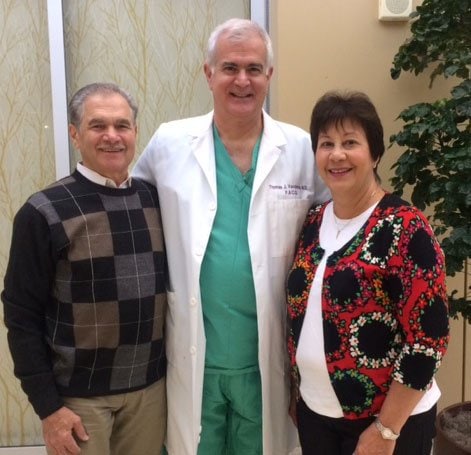Orland Park Couple Find Relief After Complex Robotic Surgeries
Midwest Institute of Robotic Surgery at Silver Cross #1 in Chicago area for surgeries performed
After 43 years of marriage, Orland Park residents Lillian and Abdiel Almodovar were accustomed to doing many activities together. However, having robotic surgeries the same year by the same surgeon was not something they thought they’d ever do together. But within months, the husband and wife duo had robotic procedures at the Midwest Institute of Robotic Surgery at Silver Cross Hospital. More robotic surgeries are performed at Silver Cross than any other hospital or surgery center in the Chicago metropolitan area.
 During a routine physical, Abdiel’s physician discovered that he had two inguinal hernias, which occur when an organ or scar tissue pushes through an opening in the muscle or tissue that holds it in place. His physician recommended Abdiel see general surgeon Dr. Thomas Vasdekas. Dr. Vasdekas determined that the hernias would only get worse if not removed, so he felt the best option for Abdiel was to have robotic hernia surgery at the Midwest Institute of Robotic Surgery at Silver Cross Hospital.
During a routine physical, Abdiel’s physician discovered that he had two inguinal hernias, which occur when an organ or scar tissue pushes through an opening in the muscle or tissue that holds it in place. His physician recommended Abdiel see general surgeon Dr. Thomas Vasdekas. Dr. Vasdekas determined that the hernias would only get worse if not removed, so he felt the best option for Abdiel was to have robotic hernia surgery at the Midwest Institute of Robotic Surgery at Silver Cross Hospital.
“I am so thankful to Dr. Vasdekas for repairing my hernias and for the kind nursing staff at Silver Cross for making my experience so great,” said Abdiel. “I was so comfortable talking with Dr. Vasdekas because he makes you feel like your old friends and able to ask him any questions.”
Then a couple months later, Abdiel’s wife, Lillian, began experiencing pain. After having a CT Scan and blood work, it was determined she needed to have her gallbladder removed. So Dr. Vasdekas performed a single-site cholecystectomy (gallbladder removal) by using the daVinci Single-Site robotic system through a tiny incision in her belly button.
“Since my husband’s surgery and recovery went so well with Dr. Vasdekas, I was very relieved to have my surgery robotically with him since it’s less invasive,” said Lillian. “I couldn’t believe I was walking the day of my surgery. My recovery was amazingly quick and I’m thrilled to report I’m pain-free!”
Benefits to Robotic Surgery
Robotic surgery far surpasses any other surgical approach because it greatly enhances the surgeon’s ability to visualize tissue allowing for more flexibility to make repairs in tighter spaces. This enhanced vision, precision, dexterity and control of the robot allows physicians to perform an excellent surgery even for complicated cases.
“In Abdiel’s case, by completing the hernia surgery using the da Vinci robot, a less invasive technique was used to make 3 small half cm incisions and then long, delicate instruments were inserted into these incisions that enabled me to perform the surgery,” said Dr. Vasdekas.
How it Works
During the procedure, Dr. Vasdekas sits comfortably at a console, viewing a 3D, high-definition image of the patient’s anatomy. He uses controls below the viewer to move the instrument arms and camera. In real-time, the system translates the his hand, wrist and finger movements into more precise movements of the miniaturized instruments inside the patient.
“Another innovation we use with the da Vinci system during some robotic surgeries is single-site instruments, which are the most highly advanced tools of surgical equipment,” said Dr. Vasdekas.
Unlike traditional surgeries, single-site robotic surgeries require a single incision in the belly button where instruments are placed, and then a diseased tissue like a gallbladder is removed.
“In Lillian’s case, her benefits to the single-site gallbladder surgery included virtually scarless results, minimal pain, low blood loss, fast recovery, a short hospital stay and high patient satisfaction. The surgery was performed in about one hour with a typical hospital stay of less than 24 hours. In fact, some same day surgery patients go home the same day,” said Dr. Vasdekas.
Interestingly, misconceptions still exist that the robot is actually performing the surgery all by itself. “The important aspect to understand is that the robotic system cannot be programmed, nor can it make decisions by itself,” said Dr. Vasdekas. “The da Vinci System requires that every surgical movement be performed with direct input from the surgeon.”
Dr. Vasdekas is one of a small group of surgeons in the country who has received training to repair hernias with robotic surgery and one of several on staff at Silver Cross Hospital. He has performed over 700 surgeries using the da Vinci®robot surgical system.
With one of the busiest robotic surgery programs in the Chicago area, Silver Cross Hospital has performed over 3,000 robotic procedures since the acquisition of the da Vinci Si Surgical System four years ago. Surgeons with the Midwest Institute of Robotic Surgery at Silver Cross use the robot to perform prostate and kidney, gynecologic, single-incision gallbladder and hysterectomy, and complex colorectal procedures. Now, with a third da Vinci robot, surgeons at Silver Cross Hospital perform the most advanced robotic-assisted surgery available today.